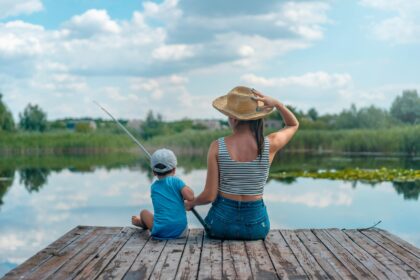
© 2024 All rights reserved.

Fishing is a relaxing and rewarding outdoor activity that offers a great way to connect with nature. Whether you’re seeking solitude or a fun family outing, fishing can be an enjoyable pastime for everyone. If you’re new to fishing, getting started might seem a bit overwhelming with all the gear and techniques out there. Fear not! This guide will walk you through the essential gear you need, important safety tips, and beginner-friendly fishing techniques.
A fishing rod and reel are fundamental to your fishing experience. For beginners, a spinning rod and reel combo is recommended due to its ease of use and versatility. Look for a medium-light rod around 6 to 7 feet long paired with a spinning reel that suits your hand size.
The type of fishing line you choose depends on the fish you’re targeting and the water conditions. Monofilament line is a good all-around choice for beginners because it’s affordable, easy to handle, and knots well. A 6-12 pound test line is ideal for most freshwater fishing scenarios.
Hooks come in various sizes and shapes. For beginners, a selection of size 6 to 10 hooks will cover most needs. Opt for a pack of bait holder hooks or circle hooks, which are easy to use and good for catch-and-release fishing.
Bobbers help you know when a fish is biting. They keep your bait at the desired depth and make fishing more enjoyable for beginners. Start with simple round bobbers that clip onto your line.
Sinkers are necessary to keep your bait underwater. Split shot sinkers are easy to use and can be added or removed without cutting your line. They come in various weights, so having a small assortment is helpful.
Live bait such as worms or minnows is effective for beginners. If you prefer artificial bait, start with soft plastic worms, spinnerbaits, or crankbaits, which are versatile and easy to use.
A small tackle box will help you organize your gear. Choose one with multiple compartments to keep your hooks, bobbers, sinkers, and lures neatly arranged.
Check your local regulations and obtain a fishing license if required. This is crucial for legal and conservation reasons.
Bottom fishing involves casting your bait to the bottom of the water where fish often feed. This technique is effective in lakes, ponds, and rivers. Use a sinker to keep your bait near the bottom and wait for a fish to bite.
Float fishing uses a bobber to suspend your bait at a specific depth. Cast your line and watch the bobber. When it dips underwater, it’s a sign that a fish is biting. This method is great for targeting fish that swim at mid-depths.
This technique involves casting a lure out and reeling it back in to mimic the movement of prey. Spinnerbaits and crankbaits work well for this method. Vary your retrieval speed and pattern to attract different fish.
Though more advanced, fly fishing can be a rewarding technique for beginners who enjoy a challenge. It involves using lightweight flies that mimic insects and requires a special fly rod, reel, and line. Start with a basic setup and practice your casting in an open area before heading to the water.
Fishing is a wonderful way to enjoy the outdoors, relax, and potentially catch dinner. With the right gear, safety precautions, and techniques, you’ll be well on your way to becoming a skilled angler. Remember to be patient, respectful of nature, and most importantly, have fun! Happy fishing!
